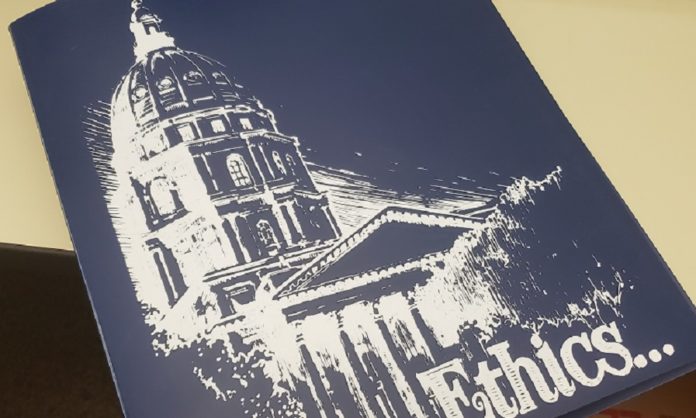The Legislature’s first attempt to rein in the state ethics commission is expected to start with a proposal limiting the agency’s ability to investigate campaign finance violations.
The chair of the House elections committee said he’s having a bill drafted that would limit the commission’s ability to issue subpoenas, which are now the focus of four court cases in Topeka stemming from a wide-ranging ethics investigation.
Republican state Rep. Pat Proctor of Leavenworth wants to require the ethics commission to get the approval of a judge to issue a subpoena.
He’s also planning a more comprehensive bill that will address who can serve on the commission and serve as executive director as well as some kind of statute of limitations for ethics cases.
Currently, the ethics commission has the authority to issue a subpoena with a vote of no less than three-quarters of its nine members.
The commission can go to court in Shawnee County to force someone to appear before the panel or produce evidence related to its investigation.
Proctor said he’s getting complaints that the ethics commission has become “judge, jury and executioner” in carrying out enforcement of campaign finance law.
“They don’t really have any oversight unless somebody decides to fight them in court,” Proctor said.
“I think there is a place to put the court in the front end of the process to make sure that we’re not using the ethics department as a weapon,” he said.
Mark Skoglund, executive director of the ethics commission, declined to comment.
The ethics commission went to court last year to force several former local Republican leaders to answer subpoenas that were issued as part of an investigation that appears to be focused on Republicans, including one of their top consultants.
Four of those officials have asked a judge to throw out the subpoenas, which seek an array of communications with many officials, lawmakers and consultants throughout the Republican Party.
The Republicans argue that the subpoenas are overly broad and violate their constitutional rights to free of speech and freedom of association.
Last week in a hearing involving a subpoena issued to former Johnson County GOP Chairman Fabian Shepard, Shawnee County District Judge Teresa Watson expressed concern about whether an ethics subpoena was legally sufficient.
Watson said the findings of fact and the conclusions of law that are supposed to be issued with the subpoena showed little indication that there was a reasonable suspicion of a violation that is required by law.
Watson said she wanted more information in the findings of fact that showed there was a reasonable suspicion of a campaign finance violation.
“The way this is drafted in terms of reasonable suspicion is very thin,” Watson said of the findings of fact and conclusions of law.
“All I have to go by is this piece of paper that’s your findings and conclusions,” she said. “You’re telling me about things that are not in this piece of paper.”
Skoglund told Watson that the agency was investigating whether campaign finance laws were violated when political action committees allegedly gave money to Republican county parties that was in turn relayed to the state Republican Party.
Skoglund told the judge of a text message on Dec. 22 that was sent from a political consultant to the treasurer of the Johnson County Republican Party.
The consultant asked the treasurer if the contributions were made to the county party, would the money be relayed to the state party, Skoglund told the judge.
The next day, the PACs gave maximum donations to three county parties and within a week most of that money went to the state party, he said.
Previous testimony indicated that ethics officials are looking at whether there was an effort to circumvent campaign finance limits from political action committees to a state party.
Court documents indicate that the commission has labeled a communication from Republican political consultant Jared Suhn to an unidentified third party as a “smoking gun” in the case.
Watson is still reviewing the matter, and a decision has not been rendered.
The ethics commission’s investigation has loomed large at the Capitol in recent months, causing some lawmakers to grow increasingly frustrated, especially with its apparent breadth and scope.
Senate Ty Masterson recently indicated he was interested in legislation that would restructure the agency without being specific.
He expressed concern that the executive director of the agency had become too aggressive in enforcing campaign finance laws.
Masterson said Skoglund had become more of an “activist.”
House Speaker Dan Hawkins didn’t go that far but stopped short of squelching Proctor’s efforts.
“Checks and balances are a necessary part of any government authority,” Hawkins said in a statement.
“I look forward to seeing what due process protections the elections committee advances to ensure those checks and balances are in place.”
Proctor said he didn’t believe any law passed this year would affect any ongoing ethics investigation.
Asked if efforts to limit the ethics commission would be perceived as retribution, Proctor said he couldn’t control the public’s perceptions.
“I know my motive is just making sure everybody’s rights are protected and that there is due process,” he said.













